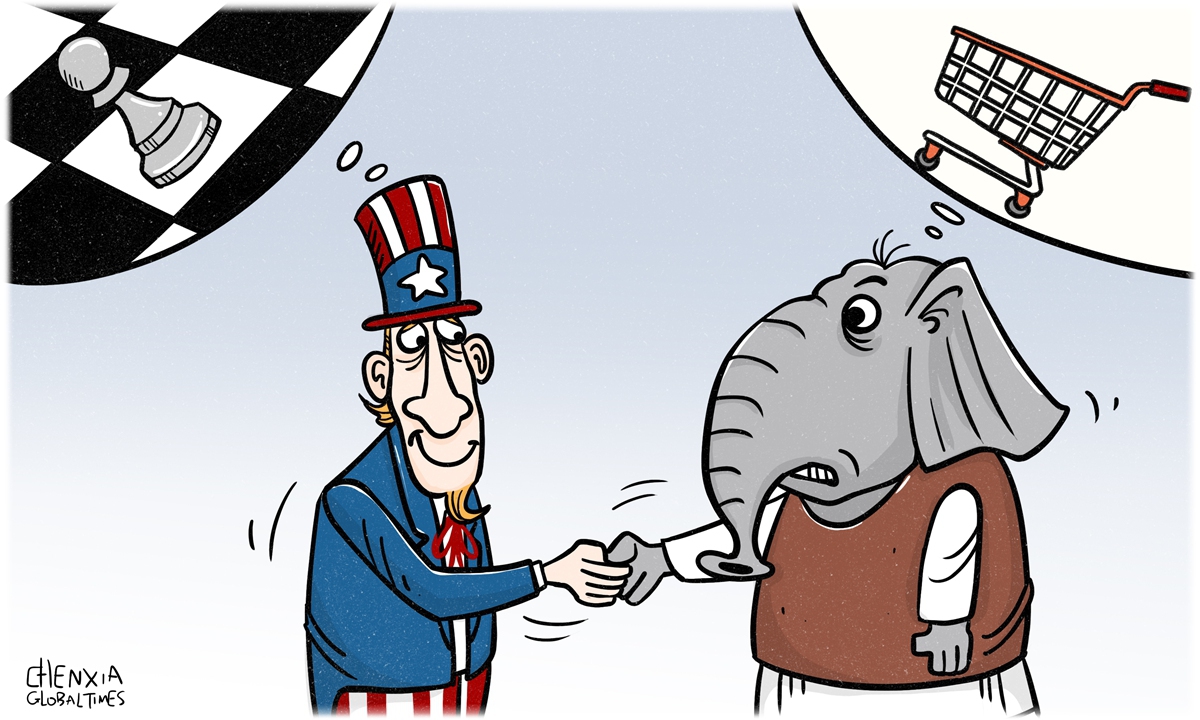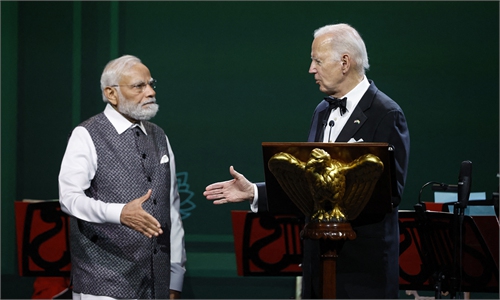llustration: Chen Xia/Global Times
Blinken’s Visit and Biden’s True Colors: Imperialist Arrogance Toward China
Blinken's visit to China leads to three jokes! [CHINA NEWS EXPRESS
It is impossible for China to accept US’ containment strategy
Washington DC became a busy city recently as the US capital was flooded with preparations for the state visit of India's Prime Minister Narendra Modi. India is what US officials, in their typical arrogance, call a "swing state," a lazy euphemism borrowed from US politics used to refer to a country with an independent foreign policy. For years, the US has been desperately courting India in a geopolitical dance to counter China, showcasing bilateral relations like US' officials parade their trophy wives.
The US regime views geopolitics only through the prism of power and strength. Power, not values or principles, is seen as the ultimate arbiter of disputes among states. Bilateral relationships for the US are transactional, with little concern for anything else. All allies are only as valuable as the returns they bring. Friends are only as good as their benefits. As Henry Kissinger once reportedly claimed, the US has no permanent friends, only permanent interests.
The US didn't become a superpower by earning other countries' goodwill, but by exploiting their fears. Today, America's own fear of China has it desperately seeking allies.
India presents an attractive target, and is being feted to the fullest possible extent by Washington. The US rolled out the red carpet for Modi's recent state visit, while its propaganda machine portrayed a cuddly image of "two great democracies" brought together by "shared values" (i.e. opposition to China). Modi has now become the first Indian prime minister and only the third world leader to address the US Congress twice.
A variety of heavyweights, from US oligarchs like Elon Musk and Ray Dalio to leaders of American think tanks that produce US propaganda, eagerly lined up to meet him.
India is willing to look past America's democratic backsliding, for good reason, given its own issues with China. India's strategy is to keep both US and China on its toes, while keeping out of US-China fights that do not concern it. So far, this approach has served India well.
Yet, hedging comes with limitations. Fickle friendships based on common hatreds (in this case, toward China) tend to be weaker than those based on common preferences. Moreover, being dependent on the US for military technology is even more dangerous than being dependent on Russia, from where India already imports around half of its military hardware.
The key caution to be exercised while embracing the US is its long history of treachery. America is notorious for backstabbing its allies; who's to say it won't do the same to India one day? When India eventually becomes powerful enough to challenge US hegemony, US attitudes would change faster than a jointly produced fighter jet. The relationship lacks depth; America's embrace of India doesn't go beyond exploiting shared apprehension toward China. It is unclear how long an alliance built on such shaky foundations will last.
In the pursuit of national interests, the US-China Great Game is simply too important to ignore. India is biding its time, and smartly trying to exploit US insecurities about China. Yet, Modi would be wise to be cautious. If history has shown one thing, it is that the US makes promises it has no intention of keeping. As Kissinger once proclaimed, correctly, it may be dangerous to be America's enemy, but to be America's friend is fatal. The US is as much a deceitful country as it is a war-mongering one. A side effect of embracing the US is that you can also smell its stench.
The author is an Indian commentator who writes about China, India, the US and global issues.
Related:
Indian Prime Minister Narendra Modi has just finished his state visit to the US, but the attention and interpretation of the trip, as well as its possible impact on the regional situation, has only started.
Blood-soaked war zone rising in India

Related posts:
-
Face to face: Blinken (second left) meets with China’s top diplomat Wang Yi (second from right) at the Diaoyutai State Guesthouse in Beijin...
-
A reporter holds a microphone with the logo of ANI during a press conference in India, on March 3, 2023. Photo: VCG Source: EU DisinfoLab...






No comments:
Post a Comment